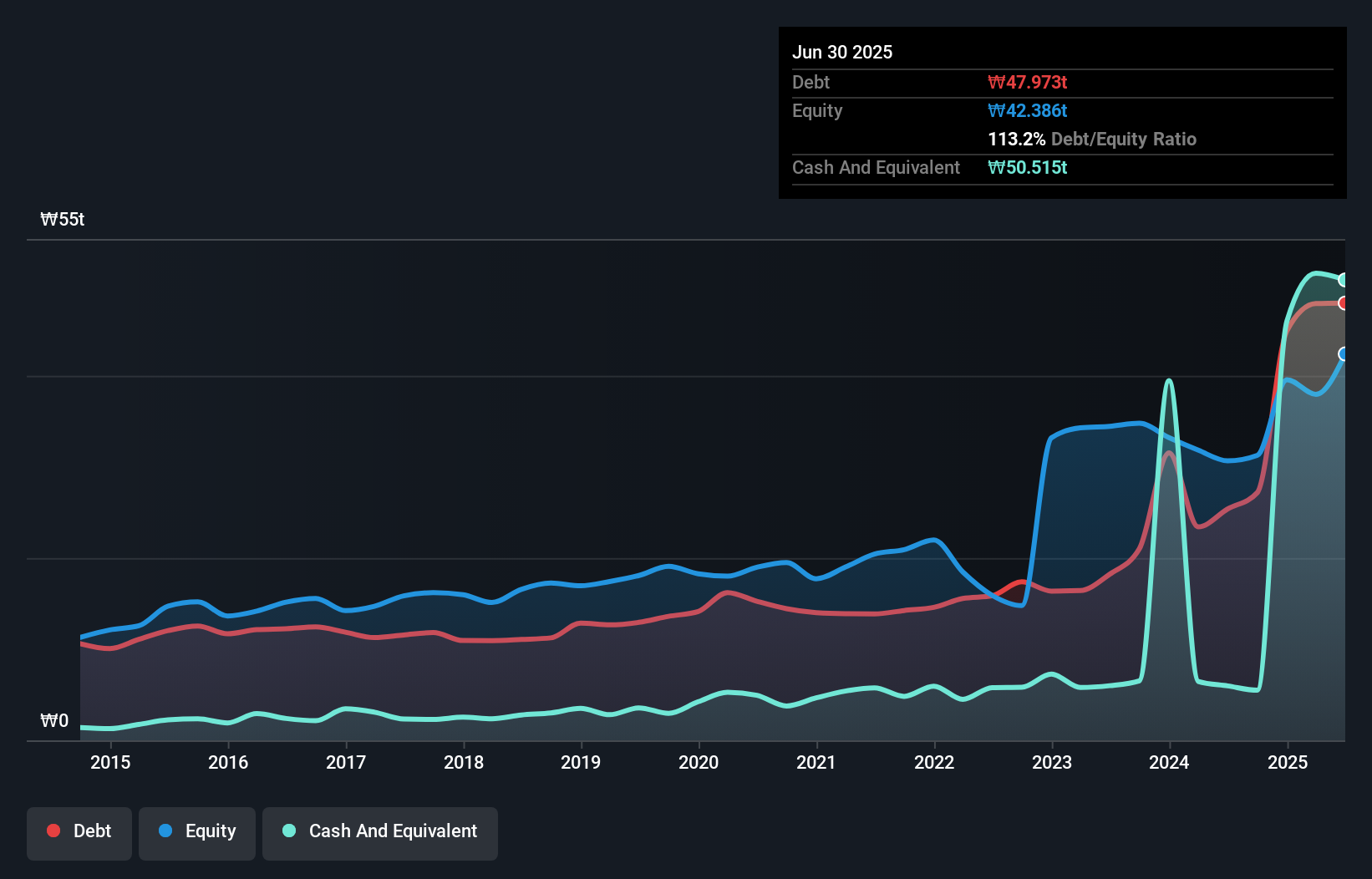The external fund manager backed by Berkshire Hathaway's Charlie Munger, Li Lu, makes no bones about it when he says 'The biggest investment risk is not the volatility of prices, but whether you will suffer a permanent loss of capital.' When we think about how risky a company is, we always like to look at its use of debt, since debt overload can lead to ruin. We can see that Hanwha Corporation (KRX:000880) does use debt in its business. But the real question is whether this debt is making the company risky.
What Risk Does Debt Bring?
Debt and other liabilities become risky for a business when it cannot easily fulfill those obligations, either with free cash flow or by raising capital at an attractive price. Ultimately, if the company can't fulfill its legal obligations to repay debt, shareholders could walk away with nothing. While that is not too common, we often do see indebted companies permanently diluting shareholders because lenders force them to raise capital at a distressed price. Of course, plenty of companies use debt to fund growth, without any negative consequences. When we think about a company's use of debt, we first look at cash and debt together.
What Is Hanwha's Net Debt?
The image below, which you can click on for greater detail, shows that at June 2025 Hanwha had debt of ₩48t, up from ₩25t in one year. But on the other hand it also has ₩51t in cash, leading to a ₩2.54t net cash position.

How Healthy Is Hanwha's Balance Sheet?
The latest balance sheet data shows that Hanwha had liabilities of ₩62t due within a year, and liabilities of ₩160t falling due after that. Offsetting these obligations, it had cash of ₩51t as well as receivables valued at ₩7.69t due within 12 months. So it has liabilities totalling ₩164t more than its cash and near-term receivables, combined.
The deficiency here weighs heavily on the ₩6.47t company itself, as if a child were struggling under the weight of an enormous back-pack full of books, his sports gear, and a trumpet. So we definitely think shareholders need to watch this one closely. At the end of the day, Hanwha would probably need a major re-capitalization if its creditors were to demand repayment. Hanwha boasts net cash, so it's fair to say it does not have a heavy debt load, even if it does have very significant liabilities, in total.
See our latest analysis for Hanwha
Notably, Hanwha's EBIT launched higher than Elon Musk, gaining a whopping 195% on last year. There's no doubt that we learn most about debt from the balance sheet. But it is future earnings, more than anything, that will determine Hanwha's ability to maintain a healthy balance sheet going forward. So if you're focused on the future you can check out this free report showing analyst profit forecasts.
Finally, a company can only pay off debt with cold hard cash, not accounting profits. Hanwha may have net cash on the balance sheet, but it is still interesting to look at how well the business converts its earnings before interest and tax (EBIT) to free cash flow, because that will influence both its need for, and its capacity to manage debt. Over the last three years, Hanwha reported free cash flow worth 3.6% of its EBIT, which is really quite low. For us, cash conversion that low sparks a little paranoia about is ability to extinguish debt.
Summing Up
Although Hanwha's balance sheet isn't particularly strong, due to the total liabilities, it is clearly positive to see that it has net cash of ₩2.54t. And we liked the look of last year's 195% year-on-year EBIT growth. Despite the cash, we do find Hanwha's level of total liabilities concerning, so we're not particularly comfortable with the stock. When analysing debt levels, the balance sheet is the obvious place to start. But ultimately, every company can contain risks that exist outside of the balance sheet. For instance, we've identified 1 warning sign for Hanwha that you should be aware of.
When all is said and done, sometimes its easier to focus on companies that don't even need debt. Readers can access a list of growth stocks with zero net debt 100% free, right now.
Valuation is complex, but we're here to simplify it.
Discover if Hanwha might be undervalued or overvalued with our detailed analysis, featuring fair value estimates, potential risks, dividends, insider trades, and its financial condition.
Access Free AnalysisHave feedback on this article? Concerned about the content? Get in touch with us directly. Alternatively, email editorial-team (at) simplywallst.com.
This article by Simply Wall St is general in nature. We provide commentary based on historical data and analyst forecasts only using an unbiased methodology and our articles are not intended to be financial advice. It does not constitute a recommendation to buy or sell any stock, and does not take account of your objectives, or your financial situation. We aim to bring you long-term focused analysis driven by fundamental data. Note that our analysis may not factor in the latest price-sensitive company announcements or qualitative material. Simply Wall St has no position in any stocks mentioned.
About KOSE:A000880
Undervalued with adequate balance sheet and pays a dividend.
Similar Companies
Market Insights
Community Narratives



